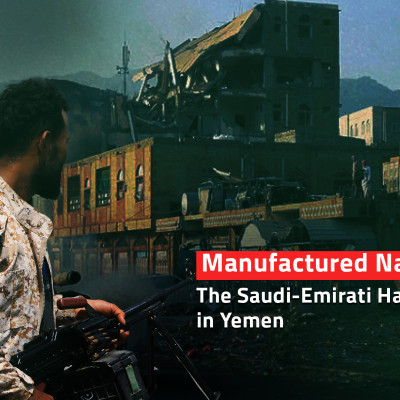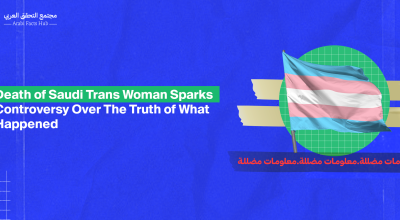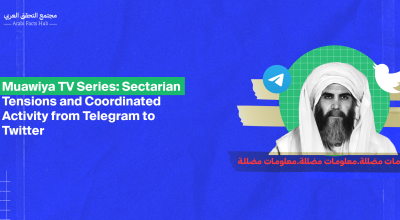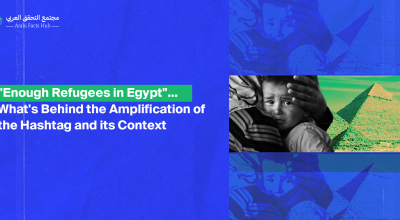"Foreign-Funded Protests" and "Qais Before the ICC”: The Tunisian Conflict Extends to Cyberspace
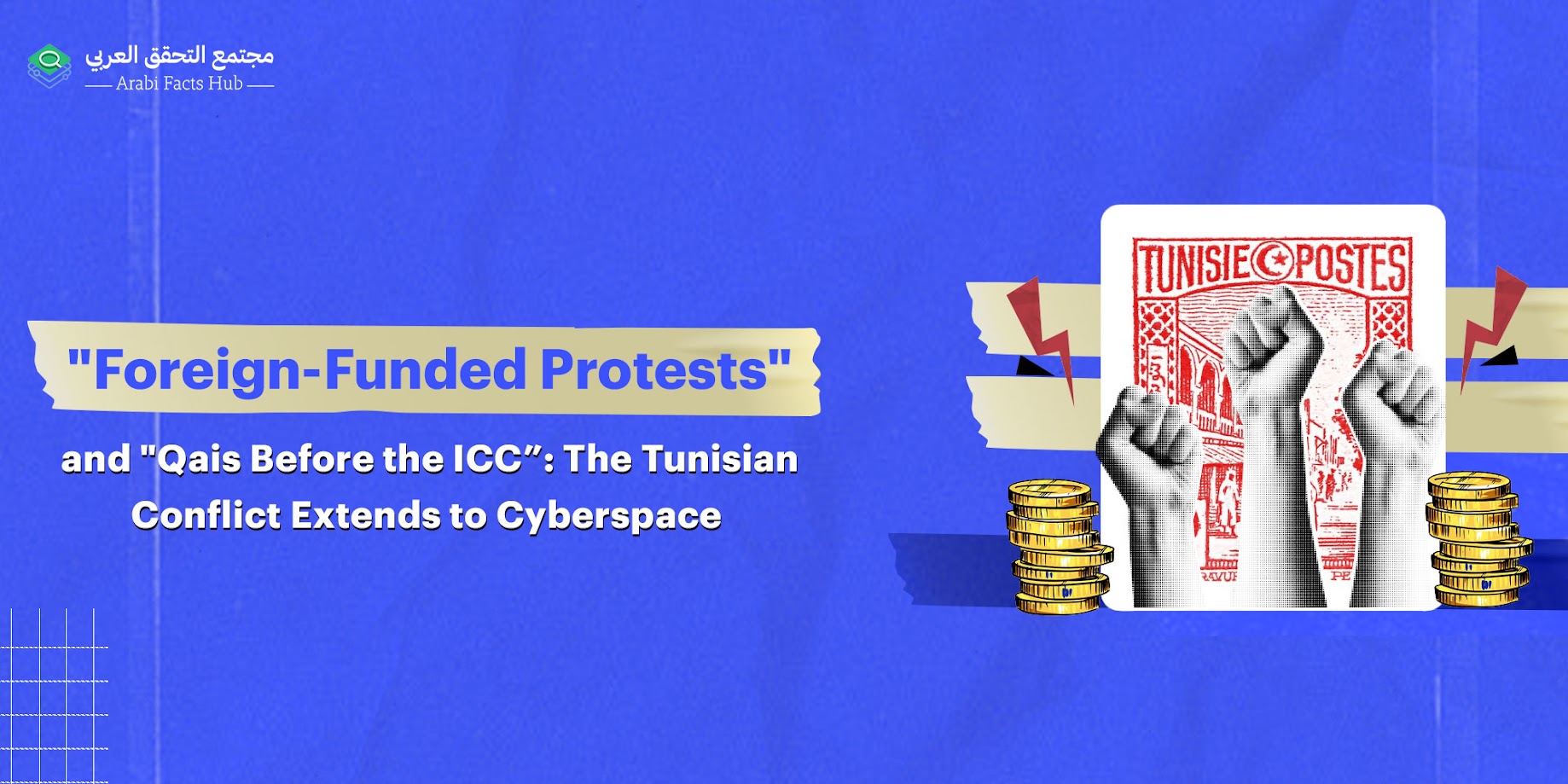
Influencers and large groups on Facebook — the most widely used platform in Tunisia—play a significant role in the propaganda machine supporting President Kais Saied. Central to these activities is the attack and defamation of his rivals and opponents.
Political polarization in Tunisia has reached its peak in recent weeks leading up to the presidential elections scheduled for October 2024. This period has been marked by protests in the streets of the capital and online battles on social media. The situation has intensified since the protests began in mid-September 2024, sparked by deteriorating human rights conditions.
While the propaganda of President Kais Saied's supporters has expanded to include defamation and incitement against his rivals and civil society organizations, several social media pages—especially on Facebook—have emerged to rally opposition against the "man of law" who has consolidated power across all authorities through a series of decrees since the summer of 2021, a move his opponents describe as a "constitutional coup."
Out of the initial 17 candidates who entered the race, three are officially competing in the upcoming elections: outgoing president Kais Saied, Secretary-General of the People's Movement Zouhair Maghzaoui, and Secretary-General of the "Azimoun" (Determined) movement Ayachi Zammel, who is currently detained on charges of "fabricating popular endorsements."
On September 7, 2024, Tunisia's Supreme Court ordered the reinstatement of two candidates to the final list of presidential candidates: Abdellatif Mekki and Mondher Zenaidi. The court warned of a legal crisis if its ruling was not respected. The ruling came after a clash between the Electoral Commission and the Administrative Court, as the commission had refused to comply with the court's decision to reinstate three candidates to the list, including Mekki, Zenaidi, and Imed Daïmi.
Propaganda for "Kais"
Influencers and large groups on Facebook — the most widely used platform in Tunisia—play a significant role in the propaganda machine supporting President Kais Saied. A central part of these activities is the attack and defamation of his rivals and opponents. One prominent such group is "Meskina Tounes" (Poor Tunisia), managed by Oussama Ben Arfa, a Tunisian blogger living in France. Oussama's public page is followed by 937,000 people, and he has created 16 Facebook groups, some of which have amassed as many as 500,000 followers. He uses these platforms to promote Kais Saied's agenda.
Ben Arfa frequently appears in televised interviews on both local and Arab stations. His social media posts archive reveals consistently negative views toward the Ennahda Movement and other opposition groups.
Other influential groups, some bearing the names of official entities, have been active in supporting Kais Saied, such as: 'Tunisian Presidency, Tunisian Electronic Army, Tunisian Radar, 30 MINS, Tunisian People, Tunisia, Ya Khadra Ba'ouk, Tunis News Network, Tunisia News Moment by Moment, Free Word Tunisia, We Are All Kais Saied Leader of the Third Republic, and Tunisia the Heart.'
When examining the creation dates of many of these groups, we noticed that they appeared shortly after Kais Saied's decisions to dissolve the government and freeze the parliament on July 25, 2021. For example, the 'Tunisian Electronic Army' group which appeared on July 27, 2021, includes at least 25,000 members, and is managed by a closed account under the name Sarrou Sarra. Its content is not visible except for a picture accompanied by a comment attacking former interim president Moncef Marzouki, describing him as a 'traitor to the nation' and calling for the revocation of his citizenship.
Defamation, Conspiracy Theories, and Hate Speech
In recent years, influencers and groups expressing support for the Tunisian president's candidacy have been notably active following his statements. Excerpts of these statements are reposted through posters and visual materials, alongside attacks on figures or entities mentioned by the president.
As protests against the president were organized ahead of the elections, posts emerged describing participants as "children of traitors" and downplaying the protests' impact and engaging in defamation and hate speech. Supporters of the president published videos alleged to be of the protests to indicate that participation in the protests was low. They also used sarcastic phrases like "Ideology divided them, but Nermine Sfar united them," referring to the Tunisian dancer who also expressed criticism of Saied's policies.
It is unclear when the images claimed to be of the protests were captured, but media coverage indicates there were at least thousands of people present. A post from the pro-president page "Tunisian Diaries" mocked the protests with a vertical image of part of the demonstrations in front of the municipal theater, saying: "A picture of the march of opposition parties, associations, and foreign-funded forces in the capital, Tunis."
On September 22, the Electoral Authority announced that it had referred the files of several associations and media institutions to the Public Prosecution, alleging that they had "received significant financial transfers from various foreign entities, both prior to and during the current electoral period, as well as during previous electoral stages."
The Electoral Authority's decision raised skepticism among Tunisians regarding the integrity of the electoral process. In parallel, there were attacks on social media against civil society institutions, media outlets, politicians, and activists. In addition to resorting to misleading information, supporters of Kais Saied often invoke conspiracy theories and promote claims of foreign interference in the country's affairs, suggesting that Saied's critics are treacherous.
On her Facebook page, which has 41,000 followers, Tunisian influencer Raghda Maliki promoted conspiracy theories alleging that media mogul and billionaire George Soros supports the recent unrest in Tunisia and aims to take control of the media. Maliki claimed that Soros supports the anti-fascist and anti-capitalist Antifa movement, allegations that have been debunked by Reuters. Maliki described participants in the protests against the president as "traitors, taking money," and questioned the credibility of the media. Similarly, other pages, such as 30 MINS, attacked civil society organizations and feminist groups, accusing them of being agents for foreign entities seeking to topple the president, stating: "They want to overthrow Kais Saied's regime with gift-taking associations."
The same page referred to an anti-president march as the "March of the deviants under the cover of a treacherous party and association."
The Tunisian Network for the Defense of Rights and Freedoms, which consists of nine political parties as well as other organizations and associations, faced the majority of attacks, with repeated incitement content published against it. The page "30 MINS," which features an election poster for Kais Saied and has 34,000 followers, was the first to launch a poster attack on the Tunisian Network with the statement: "A company went bankrupt (the National Salvation Front) so it changed its name (to the Tunisian Network for the Defense of Rights and Freedoms)."
The National Salvation Front was formed about a year after the presidential decisions of July 25, 2021 and included five parties, among them the Islamic Ennahda Movement. The front refused to participate in the presidential elections due to the "absence of the conditions of competitiveness"The page is associated with a group of the same name, which has five thousand members, and is managed by a person named Amin Hosni, who restricts access to his account, except for information indicating that he works for a subsidiary of the German company Kromberg & Schubert, which specializes in manufacturing automotive wires in the Beja region in northwest Germany.
Presidential Candidates and the Administrative Court Under Attack
The smear campaign targeted the presidential candidates and the Supreme Administrative Court, and published propaganda for the Tunisian president, suggesting that his reelection is a “completion of the path of the Tunisian revolution.” Posts from supporters of Qais Saied directed against candidates Zouhair Maghzaoui and Ayachi Zammel called for them to go “to hell,” and claimed that they are “two sides of the same coin.”
Other posts stated that Ayachi Zammel “represents the 24 regime that the people overthrew, while Maghzaoui represents a system of opportunists for personal ambitions.” Posts comparing Qais Saied to the imprisoned candidate Ayachi Zammel likened the choice to that between “either Tunisia or the wreckage of the dark decade.”
The Supreme Administrative Court is viewed as the last independent judicial body after Saied's changed the composition of the Supreme Judicial Council and dismissed dozens of judges. In early September 2024, the electoral authority refused to implement the court's decision to reinstate candidates Abdellatif Mekki, Mondher Zenaidi, and Imed Daimi to the final list, which escalated tensions related to the elections.
Supporters of the Tunisian president recurrently used expressions like “the chambers,” which were used in statements by the president, such as “corruption chambers,” and his assertion that “we will carve our path without any external interference because Tunisia is not a chamber for rent or sale.” Some posts state: “The Administrative Court is one of the dark chambers of the Ennahda Movement; the new slogan of the Administrative Court is Bhiri’s judiciary, in service of the dark decade,” referring to the period since the outbreak of the Tunisian revolution that ousted President Zine El Abidine Ben Ali on January 14, 2011.
Thirty-four members of the Tunisian parliament submitted a draft law to "amend" the electoral law, which would withdraw the Administrative Court's authority to rule on electoral disputes and grant it to the court of appeals. This new development raised concerns about the credibility of the elections. Those who submitted the draft law proposed that it take effect in the current elections, which will be held on October 6, 2024.
Pages Managed from Outside Tunisia
Conversely, several pages with tens of thousands of followers have become active across social networks to promote an anti-president discourse. Most of these pages were created in the years 2020, 2022, 2023, and 2024, with the latest ones established in June and July 2024.
These pages are managed from accounts located in various countries, including Turkey, Iran, Syria, the United Arab Emirates, Egypt, the Philippines, Switzerland, Ukraine, and Vietnam, according to transparency data from Meta, indicating a coordinated intentional effort. Facebook’s transparency feature reveals the locations of page management based on the data included in the accounts responsible for managing them.
According to this feature, the pages are engaged in broadcasting paid advertising posts related to elections and political and social issues. Each of them has published dozens of advertisements separately, with the cost of each ad not exceeding 100 US dollars.
The advertisements targeted users of Facebook, Instagram, and Messenger, primarily aimed at citizens of Tunis, Sfax, Sousse, Medenine, Ben Arous, and Nabeul. They addressed various age groups, particularly those aged between 25 and 64, according to Meta's Ads Library.
The Meta Ads Library indicates that these pages began using paid advertisements simultaneously in December 2023 and continued to launch this type of advertising until September 2024. It is worth noting that Facebook removed many of them and prohibited their appearance because the page or account responsible for them "did not follow our advertising standards" and did not provide disclosure about the advertiser or include labels indicating that they were paid advertisements.
The network states that "advertisers must also disclose when an advertisement contains a social issue or relates to elections or politics," and that this is linked to "a real image or video clip, or real audio that has been digitally created or modified."
The pages bear various names, such as "Politikas," "The Political Ghost," "Hai Al Tadamon Live," "Carthage News," "Tunis Renaissance," "Politics Belfalaki," and "The Tunisian Minister." Notably, all these pages feature uniform images of candidate Ayachi Zammel, seemingly taken from his electoral campaign materials.
On September 18, 2024, the Jendouba Court in Tunisia sentenced Ayachi Zammel to one year and eight months in prison for "forging documents and falsifying popular endorsements." The candidate, who is still in the race, faces similar charges in various Tunisian governorates.
Despite using various designs for their posts, these pages maintain the same tone and address similar topics when discussing the situation in Tunisia, especially regarding the elections, while focusing on comments and issues that engage their audience. In the screenshots below, there are examples of posts from these pages as well as others from sponsored advertisements that were deleted by Meta.
These pages have consistently attacked Tunisian President Kais Saied, labeling him as "a failure" and spreading misleading information about him, such as claiming he is being prosecuted before the International Criminal Court, which is incorrect. In reality, some families of political detainees have called on the ICC to investigate what they describe as political persecution by Saied, but the court has never summoned the Tunisian president to appear before it.




















